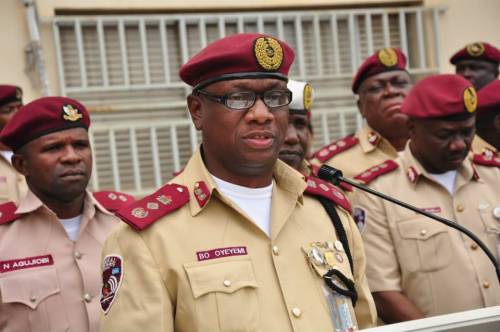
A recent report of the arrest of 37 Federal Road Safety Commission officials for their alleged involvement in corrupt practices, while on duty, is a sad development that signals the final descent into ignominy of a once-feared, diligent and highly respected government agency. The officials were reportedly picked up by a joint inter-agency team in a sting operation that took place randomly in Kaduna, Bauchi, Abia, Rivers Kogi and Ogun states.
This is perhaps a most disappointing confirmation that corruption is still very deeply ingrained in government ministries, departments and agencies, despite President Muhammadu Buhari’s avowed resolve to rid the country of the deep-seated culture of graft and usher in a new era of transparency in public office. It, therefore, stands to reason that a lot of hard work and perseverance will be needed if the government is to sufficiently clear the rot in the ailing bureaucracy.
For those who knew the FRSC at inception and what it stood for, this must have come as a very huge disappointment. It is quite a shock, but it is something people suspect might have been happening in the organisation long before now. Back in the day, its officials were known for their civility, discipline and ability to enforce sanity in road usage. They instilled respect in errant motorists as the mere sighting of an FRSC official was enough to curtail the recklessness of drivers. Few dared to flout any traffic rule in the presence of the officials, since people knew that bribing their way out of trouble was well-nigh impossible. In fact, for those who were familiar with the inadequacies of the police – and there were scores of them – the FRSC was a welcome breath of fresh air.
Unfortunately, it is not so anymore. Over the years, there appears to have been a deliberate shift by the agency from its core duty of traffic management to an unfamiliar terrain of revenue generation. At a point, practically everything about the agency was geared towards the checking of vehicle particulars and the imposition of fines. Officials were reportedly given targets of how much to deliver. In Lagos, usually troubled by chaotic traffic, they turned a blind eye to the atrocities of the ubiquitous motorcycle operators and the mini (yellow) bus drivers preferring to target expensive cars whose owners would be able to part with money to redeem their cars when slapped with fines.
At the height of that mania, the inter-state highways were virtually abandoned as city centres became the preferred turf. The corollary was an unhealthy rivalry with other agencies of government also involved in the management of traffic, such as the Lagos State Traffic Management Authority; the police and Vehicle Inspection Office. Then, whenever there was gridlock, it was not unusual to discover that it was caused by FRSC officials who might have narrowed the road with their vehicles, while scrutinising vehicle particulars, something that could easily have been done with the deployment of technology. So was the situation until the immediate past governor, Akinwumi Ambode, asked the agency to stay off Lagos roads.
Given the sensitive nature of road traffic management, which involves the prevention of carnage on the roads, there should be no room for questionable characters in the FRSC. Steps should be taken to turf out those who are giving the organisation a bad name. More of the measures which resulted in the arrest of the 37 culprits should be taken by the Corps Marshal, Boboye Oyeyemi. It is heartening that the agency did not follow the footsteps of other law enforcement agencies, which reflexively jump to the defence of their members who commit crime.
But, by partnering agencies, such as the Independent Corrupt Practices and Other Related Offences Commission and the State Security Service officials to effect the arrest of the 37 venal FRSC personnel and their civilian collaborators, Oyeyemi has finally demonstrated his commitment to cleaning the Augean stables. But it should not stop there; he should fight to ensure the agency is able to match the performance of its counterparts in other parts of the world. This can only be achieved by properly funding its activities.
A top official of the commission once confessed to not having adequate vehicles to patrol the highway, let alone breakdown trucks to tow impounded vehicles, especially with the drivers always attempting to resist arrest. This is quite embarrassing because the job requires a lot of mobility and equipment. But beyond the provision of patrol vehicles, it is important to deploy technology in the course of duty. This will drastically reduce the level of interface between the officials and members of the public, resulting in a drop in the level of corruption.
FRSC boss should drive road safety forward with intelligent traffic enforcement and smart technology. Fortunately, Lagos State has already taken that route by replacing the physical presence of traffic agents, especially the VIOs, with the Automatic Number Plate Recognition system and the Closed-Circuit Television. The technology which was invented in 1976 in the United Kingdom does not only have the capacity to track traffic offenders by recording their numbers but can also deal with vehicle documentation defaulters. According to POLICE.UK, ANRP also helps to detect and deter crime, “including tackling travelling criminals, Organised Crime Groups and terrorists.”
It is a thing of shame that there is hardly any agency of the government that could be said to be untainted by corruption but efforts should be made to fish out the culprits and punish them. In the case of the 37 that were caught in the act, the FRSC has to make sure that they are properly investigated and brought to book to serve as a deterrent to others. But the need to invest in technology cannot be over-emphasised; that is the way the world is going and the FRSC cannot afford to be left behind.
END

Be the first to comment